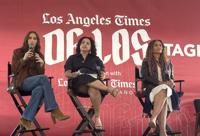
(left to right) Panelists Codie Sanchez, Giovanna Gonzaléz and Sylvia Pérez Cash. Photo by Brenda Verano
This year's De Los stage at the L.A. Times Festival of Books included a discussion about Latinos' financial wellness, economic equity, and financial future.
The 30th annual Los Angeles Times Festival of Books returned to the University of Southern California campus last Saturday and Sunday, with numerous notable forums and educational panels.
The all-Latina panel consisted of Sylvia Pérez Cash, chief innovation officer at the Latino Community Foundation (LFC); Giovanna Gonzaléz, a financial educator, public speaker, and author of “Cultura and Cash”; and Codie Sanchez, founder and chief executive officer of Contrarian Thinking, a digital education company, and Contrarian Thinking Capital, a small business holding company that is focused on bringing Main Street businesses back to the limelight.
Pérez Cash, who is directly responsible for deepening and expanding LCF’s grantmaking footprint and impact and ensuring operational excellence and culture throughout the foundation, talked about how financially powerful the Latino community is in the United States. According to Pérez Cash, closing the disparities in the amount of money that enters those communities is essential when discussing wealth creation and releasing Latinos' economic potential. Despite that, she said Latinos have immense power in the local and national economy.
“The money that Latinos created through sales and through production in 2022 reached $3.6 trillion,” she said. “If you think about that from a global perspective, if U.S. Latinos were an independent country, our economy would be ranked the fifth largest economy in the world. There's significant economic power in our communities… but you wouldn't know it by the way that our economic systems treat our communities—the way that they build barriers around our communities.”
Sanchez, who owns many mainstream businesses, including car washes, laundromats, roofing, painting and handyman companies, told attendees that to gain economic freedom, owning a business is the way to go. “You have to remember that 60% of all millionaires own a business,” she said. “If we want to make a lot of money, we have to own things. Money equals asset ownership.”
Gonzaléz, who also teaches personal finance to first-generation professionals at various organizations and on her social media accounts, talked about the importance of dismantling negative financial narratives that many times Latinos grew up believing. She said that she grew up with the notion that there was never going to be enough money. “I remember just that if we went to the store or Walmart and I wanted something, that was always the answer. That very much got embedded into adulthood,” she said. “When you believe that there is no money, you don't strive for money because it's not there.”
She said that in her book “Cultura and Cash,” she talks about adapting new mindsets when it comes to money and finances, especially as first-generation Latinos. “I’ve had to do a lot of unlearning to adopt a mindset of abundance and at first it feels really cringe because it's not how we grew up thinking that the world is our universe, that there's money flowing easily through us,” she said. “That's why I'm such a big fan of affirmations and I include them in the book because the more that you say [them], eventually you create new neural pathways to be able to believe that and to listen to your subconscious and you're able to believe these better money beliefs.”
Pérez Cash also talked about the power and responsibility of philanthropy to invest in Latino communities, businesses and economies. The LFC, which is the nation’s largest Latino-serving foundation, activating the largest network of Latino philanthropists and funding grassroots nonprofits, is an example of this. “Our money is also powerful as philanthropic investors,” she said. “We can drive change on a systemic level with our dollars as individuals, not just through our neighbors or through our family members, but through the systems around us.”

This year's 30th annual Los Angeles Times Festival of Books returned to the University of Southern California campus. Photo by Brenda Verano
All the panelists also tspoke of how people can protect their finances from taking a steep hit from tariff changes executed by the Donald Trump administration, the dip in the stock market and a possible recession.
Gonzaléz said that for her, cutting back on big expenses and being careful about spending rapidly is a very important tactic. “It's really hard to adopt that mindset and just like our consumer society, capitalistic society that we live in, that's constantly telling us to buy, do this to feel better, to be prettier, to be healthier, so it's something you constantly have to resist, but it's so important, especially through volatile times like this,” she said.
Sanchez invited attendees to think of a possible recession as an opportunity to invest, acquire or redirect one's finances. She said that, although scary, a recession can be beneficial if one has enough financial education. “I think we should try to flip our view here. If instead of saying, ‘Why is it terrible that we're in a resession?’ we go, ‘Where's the opportunity that lurks around? Because money is made in every single market,” she said. “In fact, many of the richest people in the world made their money post-recession because they had smart planning.”
Pérez Cash said a pending recession is also an opportunity to make one's voice heard and be more civically engaged to create economic change at a local, federal or international level.
“What we're really looking at is the outcome of a unilateral single set of policy choices by a single administration,” she said when talking about tariffs and a possible recession. “One of the opportunities that I would say for anybody, business owner or not, is that if you want to make change, if you don't have the financial capital to invest in your nonprofit partner, invest in a community issue, or invest in a company you own. You do have time. You have time to be more civically engaged. You have time to call your local congressmen and your local district representative and say, ‘Hey, these policies that are being pushed down, they're negatively affecting me. They're negatively affecting my business.’ Tell your story. People and politicians need to hear your story.”











(0) comments
Welcome to the discussion.
Log In
Keep it Clean. Please avoid obscene, vulgar, lewd, racist or sexually-oriented language.
PLEASE TURN OFF YOUR CAPS LOCK.
Don't Threaten. Threats of harming another person will not be tolerated.
Be Truthful. Don't knowingly lie about anyone or anything.
Be Nice. No racism, sexism or any sort of -ism that is degrading to another person.
Be Proactive. Use the 'Report' link on each comment to let us know of abusive posts.
Share with Us. We'd love to hear eyewitness accounts, the history behind an article.